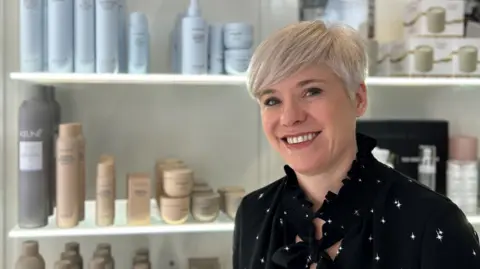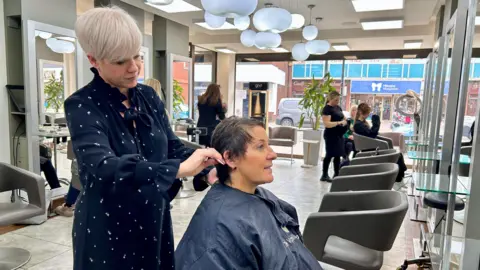'I don't have the margin to invest in apprentices'
 BBC
BBC"We don't have the margin with the new taxation to actually invest in the future of the industry," says Kerry Larcher, the owner of a hair salon in east London.
She is one of many hair and beauty salon owners who say they cannot afford to take on apprentices following the 2024 Budget.
"The government's decisions in October will cost me over £1,000 a week," Ms Larcher said.
"I have 36 employees and 12 of which are apprentices. We normally take about four to five apprentices year. This year we're considering not taking any."
The British Hair Consortium – which represents 50,000 UK hairdressing professionals – is calling on the government to halve the VAT salons pay on labour costs to 10%.
Salons pay VAT at 20% like most businesses but the British Hair Consortium argues because the work they do is so labour intensive as opposed to selling products, they have less of a chance to make back those costs.
So to keep costs low, it says an increasing number of salons are opting to rent chairs instead of employing stylists to avoid paying the tax.
A report by CBI Economics found that is likely to have a knock-on effect on opportunities for apprentices.
A HM Treasury spokesperson said they were "levelling the playing field" for high street businesses, including hairdressers, by permanently cutting business rates.
'Costs are escalating'
Ms Larcher runs her business, The Vanilla Room hairdressers in Hornchurch, by having employed staff.
She says by having the two business models "taxed completely differently" creates an uneven playing field.
"It's not that we want to not pay our way," she said.
"It's that we want an even playing field and actually proper regulation.
"That would mean that we could invest in apprentices further in the future.
"The biggest problem that my employed business model is having is how do we employ apprentices when the costs are escalating?"

A report from independent consultancy CBI Economics found that the labour-intensive nature of hair salons meant they were impacted by taxes three times as much as other high street operators.
It said that by 2027 there may be no new apprenticeships offered and direct employment could drop 93% by 2030, due to the costs.
Toby Dicker, co-founder of the British Hair Consortium, said: "A 'one size fits all' tax system doesn't work and has created an unlevel playing field.
"Increasing numbers of owners are either closing their salons or changing their employment practices and are renting chairs to contractors just to survive."
Mr Dicker said cutting VAT to 10% would "save salons across the country".
A spokesperson for the Treasury said they were removing the £110,000 business rates relief cap for more than 280,000 retail, hospitality and leisure business properties.
Listen to the best of BBC Radio London on Sounds and follow BBC London on Facebook, X and Instagram. Send your story ideas to [email protected]
